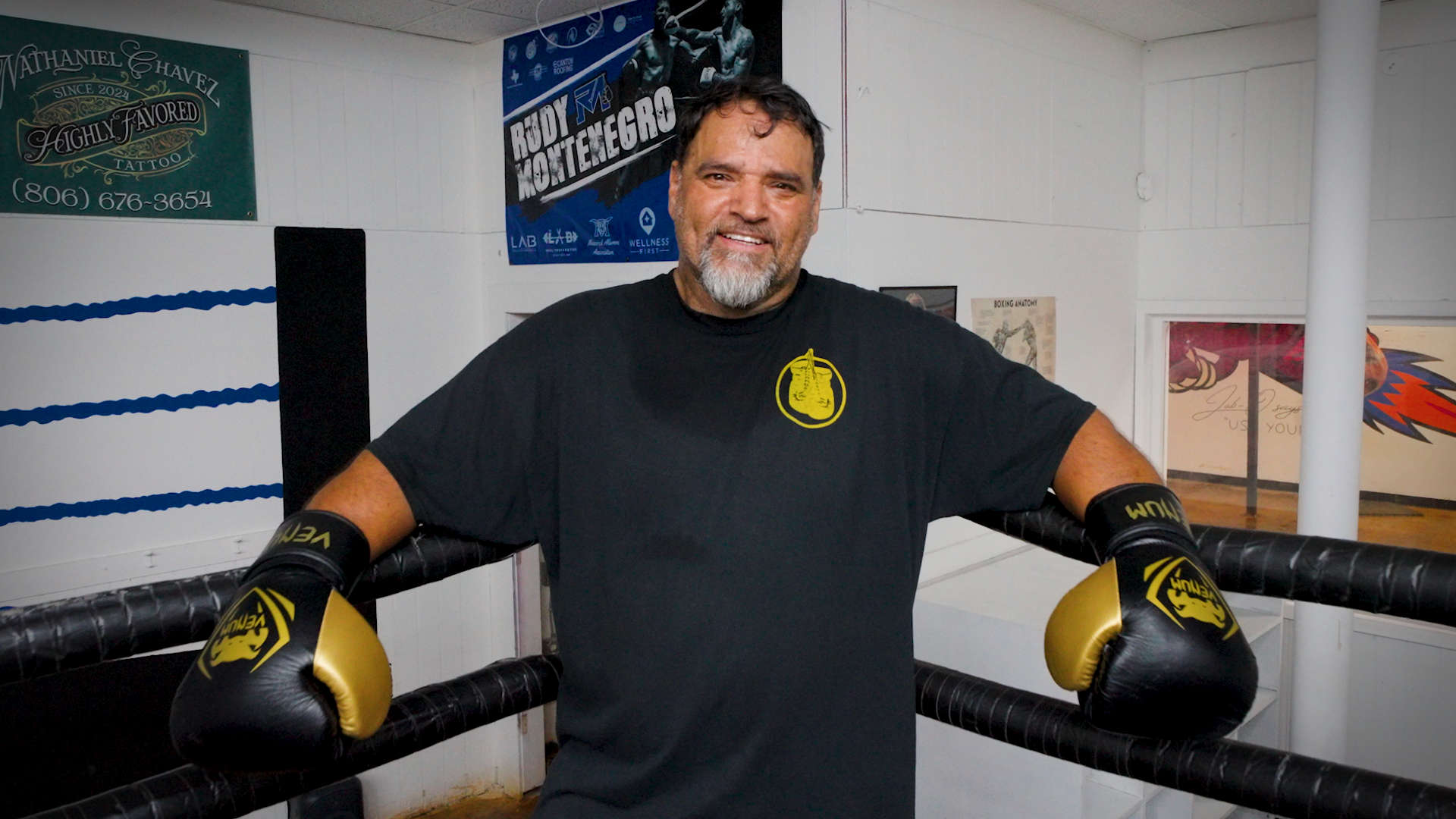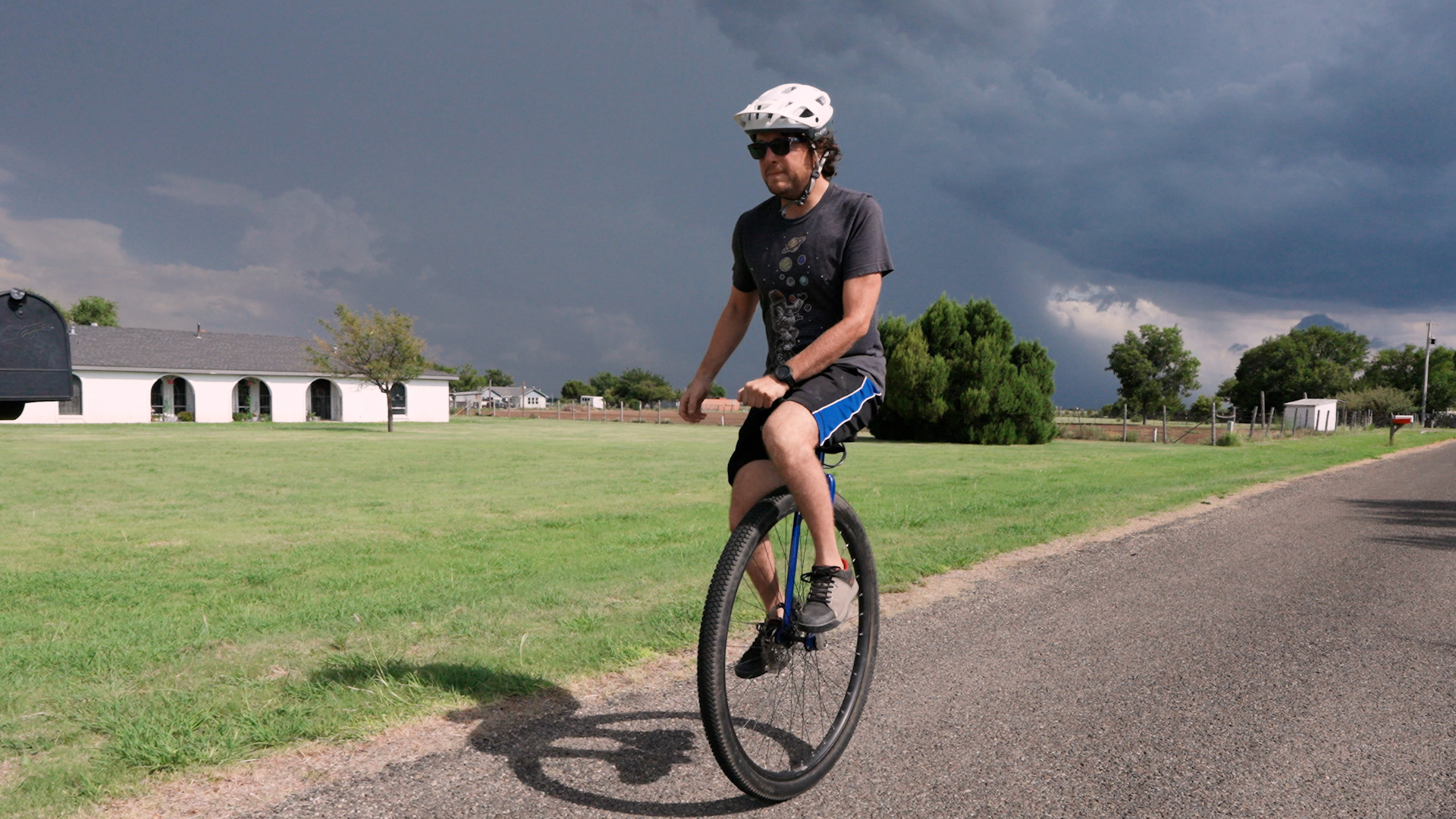Pantex Blog
People of Pantex: Andy Sotelo

For Pantex expediter Andy Sotelo, boxing saved his life. He knew while growing up in the small town of Fairview, Montana, that there were more ways to find trouble than not, but boxing gave him purpose and drive.
“Coach said ‘come and practice,’ so we did, and it kept us off the streets,” Sotelo said. “Also, my uncles used to box so I kind of wanted to follow their footsteps.”
Sotelo boxed competitively for 13 years starting in middle school before moving on to amateur level fighting as a 165-pound middleweight. Over his career he boxed in 130 matches, winning 100 of them.
Sotelo’s lucky number must be five as he is a five-time Golden Gloves champion, five-time state champion, and five-time regional champion. He went to nationals five times, placing as high as third in the nation.
“I've been knocked down a couple of times, but never knocked out,” he said. “And I still got my teeth.”
For Sotelo, boxing wasn’t just a fun sport he was good at; he loved the opportunities it gave him to travel and see more of the country. He once fought at the Olympic Center in Colorado Springs, Colorado, and in Canada four different times. He fought among those who would later make big names for themselves such as Floyd Mayweather Jr., Antonio Tarver, Jermain Taylor, and Jeff Lacey.
One of the biggest matches Sotelo fought was against Canada’s national champion in 1998 and was broadcast on national TV. A fight that he won.
“I sometimes regret not going pro,” he said. “But I know I’m where I’m supposed to be.”
As an expediter, Sotelo has handled material moves with a forklift for seven years after starting his Pantex career as a custodian. Before that, he ran his own cleaning business for the 13 years.
“It's very important we bring material down to the south end, or to the north end,” he said. “It's a pretty good job to have and working on your skills is huge.”
Like boxing, Sotelo says his job requires practice, focus, and having the right mindset to be prepared for anything, because every fight is different.
“In boxing, working on your skills is everything and that translates to my job,” he said.
Sotelo continues to be involved in boxing as exercise. He’s still got the speed and heart, but gets tired more quickly than he used to. He also continues his involvement as a mentor to younger hopefuls. He feels honored to show them the basics.
Both his son and daughter got into boxing for a while and his daughter was especially impressive. He’d like to get even more involved in working with young boxers to share some of the life advice that has helped him in his life.
“From inside the ring to outside of the ring, be confident, be positive,” Sotelo said. “Sometimes life is a struggle, you know, it’s just how you roll with the punches. Just make the best of it.”
Watch this video to watch Andy Sotelo, amateur boxer and proud Pantexan, in action.
Pantex Proud: Michael Sauls

Thousands of dedicated Pantex citizens like Michael Sauls work every day to support the Pantex mission. Take three minutes to learn about who he is, what he does, and why he is proud to be a Pantexan.
Continuous learning is on the forefront of our minds today, with countless people learning for the sake of it. Maintenance Planner Michael Sauls is learning for the generations to come.
Sauls, who has been a Pantexan for the last seven years, started as a material handler and worked his way to being an area mechanic four years later. After two more years working on vehicles, he moved into his current role. With planner in his title, it is no surprise that Sauls is working towards making the plant better, not only for today, but for future generations of Pantexans.
“I try to be a futuristic person,” Sauls said. “I want to build a better future for our new people coming up. It’s hard to be heard sometimes, so I use my ability to speak up for others when they can’t.”
Making sure things work well together is Sauls’ specialty; whether that be the people he works with or the way he plans maintenance work, everything Sauls does is for a reason.
“We get everything for the job put together for colleagues to be able to perform work smoothly so they don’t have to worry about being able to do their job,” Sauls said. “Because we have different experiences, I know we will handle situations differently, but I am able to work with everyone — and learn from them — because at the end of the day I know we are working towards the same goal.”
Sauls is also learning a new language, one that he thinks will serve him well when he considers future work: coding. After some health issues during adolescence, Sauls found that he loved technology and has tried keeping up with the ways it could affect him. Considering technological advancements the plant is implementing, Sauls is excited about the way things are moving forward.
“I see the direction we are going as a plant and I don’t want to limit myself,” Sauls said.
Through constant learning and with the support of his ever-growing community, Sauls continues to push his limits and develop as a proud Pantexan.
What do you enjoy most about working at Pantex?
The people are what make this place very enjoyable. Learning what makes us different is really intriguing to me.
What do you think makes Pantex so special?
The accountability we have within the people. Pantex trusts us every day to make the right decisions, inside and outside of this place. It speaks volumes when you build a community based on trust in a diverse company like this.
Anything else you’d like to add about your role, your team, and/or Pantex/the mission?
Anything and everything that I can bring to my role or team is growth. I always want to exceed expectations for the company and with people every day. When you’re able to develop and grow with people, you continue to learn more about them and yourself.
What’s your top bucket list item and why?
I want to travel the world, but I don’t have specific places in mind. I want to be able to enjoy the wonders of the world and to actually see those wallpapers we get on our computer. Someone had to capture it in life; I want to be able to capture it in person.
Aggies vs. Red Raiders: A battle of innovation
RANK Shields from Texas Tech won first place at this year’s Innovation Challenge.
Texas A&M Aggies versus Texas Tech Red Raiders is a match-up that has not happened since 2011 when the two football teams met for the final annual matchup before conference realignment - until now.
Students from the two universities went head-to-head in a matchup focused on innovation, not football.
Three teams from each institution traveled to Pantex on November 7 to compete in the championship round of the annual Pantex Innovation Challenge. The groups were the top finalists after preliminary competitions at their respective schools.
Texas A&M held their "Aggies Invent" challenge in mid-September at the main campus in College Station, Texas. The Red Raiders held their competition in Lubbock, Texas, in mid-October. Both competitions tasked the students with inventing solutions to real-world problems and issues encountered at Pantex. Representatives from Pantex attended both competitions to assist the students with their invention presentations and judge the final pitches.
"The innovation challenges are competitions based on innovation of mission-critical problems that students can participate and provide implementation pathways for winning solutions," said Brenda Dillard, Pantex Partnerships and Technology Transfer program manager.
The teams that competed from Texas A&M were:
- A.U.R.A (Autonomous Unmanned Robotic Arm)
- Barracutta
- AutoTool Inc.
The presentations and teams from Texas Tech were:
- AutoChem Analytics
- IntelliAI
- RANK Shields
"This brings an opportunity to innovate with people I have never met before all while putting my name out to Pantex," said Matthew Valdez, a freshman engineering major from Texas A&M and member of A.U.R.A.
All six teams performed well, and the judges had a difficult decision to make in choosing the top three.
"This is the first time we have done this event at Pantex. It’s beneficial to get these students here and a little healthy competition between two schools in the state of Texas is great," Tyfani Lanier, Pantex engineering division director and chief engineer said. "I look forward to continuing the expansion of the Innovation Challenge and hearing more from talented students who make up the future of Pantex."
RANK Shields from Texas Tech took home the bragging rights of being named the Pantex Innovation Challenge Champion and $10,000 to support continued learning and inventing.
Earning second place and $5,000 was IntelliAI from Texas Tech. AutoTool Inc. rounded out the competition, taking third place and bringing $3,000 back to College Station.
"This challenge introduces the skill of team work and collaboration with people from different majors and backgrounds," Ethan Rojas-Tovar, a senior mechanical engineering major and member of the winning RANK Shields team from Texas Tech explained. "I enjoy coming up with an innovative solution on the spot and this is an amazing networking opportunity."
The Pantex Innovation Challenge is one example of how Pantex invests in partnerships with higher education institutions and the future workforce.
"It is critical that Pantex invest in academic partnerships. Students bring fresh perspectives, innovative approaches, and access to academic research, while Pantex offers real-world problem exposure, mentorship from experienced professionals, and career pathway development," Dillard said. "We treat every student interaction as developing a potential future employee or long-term collaborator."
When will the two universities meet up again for a challenge? Time will tell, as both football teams are doing well this season. For now, Texas Tech holds the bragging rights for winning the Pantex Innovation Challenge.
Students from Texas Tech's IntelliAI team with their second place award.
Texas A&M students from the AutoTech Inc team with their third-place prize.
Top 20 Under 40 Award Winners

Top 20 Under 40 Award Winners
Every year, the Amarillo Chamber of Commerce recognizes local professionals who are actively making a difference in their communities, on and off the clock, with the Top 20 Under 40 Awards. This year, three Pantexans are being recognized for contributions to their work place and community.
All of the award recipients have shown excellence in their profession and have worked in the Amarillo area for a minimum of three years in the same field. Applicants are reviewed and selected by a panel of judges. Each recipient of the Top 20 Under 40 awards were recognized at the Amarillo Chamber of Commerce Business Excellence Awards Celebration on August 28, 2025.
Ashley Massucci started at Pantex eight years ago in Performance Excellence as a data analyst and currently works as the chief of staff in the Office of the President. Outside of work, Massucci volunteers at Sleepy Hollow Elementary and First Baptist Church of Amarillo. During the holiday season she serves on the committee for Christmas Roundup at the Amarillo Museum of Art Alliance. This is a large event and one of Massucci's favorite events to volunteer for.

Massucci has been recently appointed to serve on the boards for both Heal the City Free Clinic and the Panhandle Adult Rebuilding Center (PARC). Heal the City provides free health care, food, clothing, and educational resources to those in need, while PARC focuses on helping those who are homeless gain stability and plan their future.
“I was born and raised in Amarillo and have deep roots in the community,” said Massucci. “I love Amarillo and am passionate about the city and its continued growth. With Pantex being the largest employer in the region, I am honored to represent Pantex in receiving this award. I hope I can
continue to do my part to strengthen the community and make it a place my own children and grandchildren choose to establish roots someday.”
Shian Yada is the deputy assistant manager for Environment, Safety, Health, and Quality at the National Nuclear Security Administration's Pantex Field Office and has been a part of Pantex for 12 years. Yada's passion for environmental health and safety is not only reflected in her work, but also in the ways she contributes to the community.

Yada volunteers for animal rescues in the Amarillo area, providing shelter, medical care, and long–term placement to animals in need. She is also a volunteer at the Arabian Horse Association, where she works to support their education programs, youth development, and outreach initiatives. Each of
these programs are designed to help youth learn horsemanship and safety as well as foster leadership.
“Being selected for the Top 20 Under 40 Award by the Amarillo Chamber of Commerce is an incredible honor and a meaningful milestone in my journey,” Yada said. “It represents not just personal achievement, but a commitment to service, leadership, and giving back to the community.
I'm humbled to be recognized among such driven and impactful peers.”
Maeghan Brundrett has been at Pantex for six years and is currently an analyst for Project Performance Analytics. In her role at Pantex she is dedicated to working with interns and new hires as they enter their new roles. She is also a peer mentor, working with her colleagues to better themselves through skill development and share her passion for leadership.

Leadership is how Brundrett gives back to her community as well. She was on the committee for the Pantex Community Investment Grant Committee for two years, where she helped award grants to local non–profit organizations in the Panhandle region. Currently she focuses on outreach for women in science, technology, engineering, and math, commonly referred to as STEM. Among her volunteering efforts Brundrett served as an instructor and mentor for the Army Research and Engineering Apprenticeship Program (REAP), and is currently working with Science – It's a Girl Thing and the Catch the Engineering Bug program.
“I am incredibly honored for being selected as one of the Top 20 Under 40” said Brundrett. “The impact of others' mentorship and leadership throughout my life is a reflection of this recognition and I am humbled to be chosen. God has truly blessed me and I am so proud to be a Pantexan and a citizen of Amarillo.”
All three award winners are a true testament of what it means to be a Pantex Citizen.
People of Pantex: Bryce Garrett

Bryce Garrett rolls through life on his unicycle.
Bryce Garrett didn’t choose the unicycle — the unicycle chose him.
While rummaging through the attic as bored teenagers, he and a friend stumbled upon his parents’ old unicycles and decided to ride their way out of boredom. Garrett practiced riding the unicycle next to a handrail and eventually graduated to riding unassisted at home. Not one for standing around and chatting at parties, he would ride now and again for audiences. After a few years, though, the unicycle was forgotten.
Fast forward to 2012, when Garrett was hit by a car while riding his motorcycle. The crash dislocated his left hip, left his calves paralyzed, and severed two of the three nerves in his neck that control his left arm. After a trip to the Mayo Clinic, doctors reattached the nerves, allowing him control of his arm again from his pinky to his bicep.
“My accident makes me appreciate coming to work,” Garrett said. “I know that sounds crazy, because when Monday morning rolls around, nobody really wants to go to work, myself included. Then I was at the Mayo Clinic and that was all I wanted. I wanted to be able to go back to work and do my job, because at that time, I couldn't.”
Despite the pain of recovery, Garrett knew that he had to get active for his physical and mental health, because both were slipping away from him. He tried running, but that was a no-go. Then one day his nephew mentioned the unicycle, and he decided to give it a shot. Once again, the unicycle chose him.
Turns out unicycling is like … well … riding a bike. Your body doesn’t forget how to do it. What Garrett wasn’t expecting was how difficult it would be to build up endurance. When he realized that unicycling was an option for him, it started a snowball effect. He decided one day that he wanted to ride the Lighthouse Trail at Palo Duro Canyon in Canyon, Texas. Once he realized he was capable of that, he set his sights on racing. He has since participated in several races, each of them special to him for different reasons, like 24 Hours in the Canyon, a bike race benefitting cancer survivors. Garrett is a record holder in this race for the fastest time on a unicycle. This past year, he rode 102 miles in a 24-hour period.
“These cancer survivors wake up every day and fight that fight,” Garret said. “Normally it’s meditative to ride … but during the 24 Hours event, I think a lot about them. It really fires me up to turn something that was very painful for me into something that can help somebody in a different situation. It's hard. It's difficult. And I push myself as hard as I can. But it's because I want to honor those people fighting cancer.”
Garrett started at Pantex in Infrastructure in 2018 as a mechanic and was recently promoted to a supervisor position. Riding a unicycle is not only a stress relief, but it has taught him the lesson of patience — and how to get back on the seat when things get tough. Those are the same lessons he tries to teach his daughters.
“I brought a cycle home and my wife laughed about it, but my daughters claimed it and I didn't argue,” he said. “So, now they have a unicycle.”
Three generations of Garretts have now kicked “the training wheel” for a singular hobby. Garrett picked up his parents’ unique unicycling, and as he tries to provide “a magical childhood” to his own kids, they have found a connection that most people wouldn’t dream of trying. Though fun might be the key motivator for starting to unicycle, it means much, much more to Garrett.
“It's kind of immeasurable how much it helped, really.” Garrett said. “Looking back, I was dealing with not being able to physically do some things I used to do. It made me realize that … I still have a lot of joy in life, and riding helped me gain my confidence back.”
Watch how Bryce chooses a hands-free approach to dealing with life's punches here:
